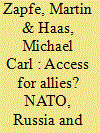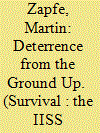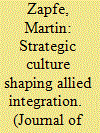| Srl | Item |
| 1 |
ID:
145942


|
|
|
|
|
| Summary/Abstract |
One of the most important debates currently underway within NATO focuses on the extent to which the Alliance should have a forward presence of Allied combat forces in the exposed Baltic States. Limited-presence arrangements are likely to fall short of their deterrent purpose if they fail to account for Russia’s growing ability to threaten NATO’s operational access to the Baltics. Martin Zapfe and Michael Carl Haas argue that any NATO strategy of assured access would face significant hurdles and come at a price. Although it could considerably strengthen conventional deterrence, such a strategy would be liable to exacerbate the regional security dilemma and could lead to a lasting regionalisation of the Alliance.
|
|
|
|
|
|
|
|
|
|
|
|
|
|
|
|
| 2 |
ID:
153363


|
|
|
|
|
| Summary/Abstract |
As a nuclear alliance, NATO’s deterrence is ultimately based on the threat of nuclear retaliation. However, Russia under President Vladimir Putin seems to have rejected the established Western playbook, opting instead for ‘cross-domain coercion’1 that transcends conventions in deterrence, most importantly the balance between conventional and nuclear forces. NATO’s answer since 2014 has been largely based on conventional adaptation mirroring similar evolutionary steps in the Alliance’s history. Important as these measures may be, there is a danger that they will fall short of enhancing allied deterrence, and may even be harmful to it, if they do not take into account the essentially political nature of the Russian threat.
|
|
|
|
|
|
|
|
|
|
|
|
|
|
|
|
| 3 |
ID:
146913


|
|
|
|
|
| Summary/Abstract |
With the Afghan mission winding down, the German Bundeswehr is in the process of implementing a new doctrinal system, resting on the adoption of NATO doctrine and a new joint operational doctrine. This is a historical first, which this paper argues is explained by two factors: functionally, for armed forces deeply integrated into NATO, the practical need for a joint operational doctrine did not exist. More importantly, culture matters: Germany features a highly institutionalized strategic culture that places distinct limits on some forms of joint doctrine. Thus, while impressive and logical, current doctrinal plans of the Bundeswehr, relying as they do on an ‘alliance shortcut’, raise important questions that need to be answered to ensure continuously functioning civil-military relations.
|
|
|
|
|
|
|
|
|
|
|
|
|
|
|
|